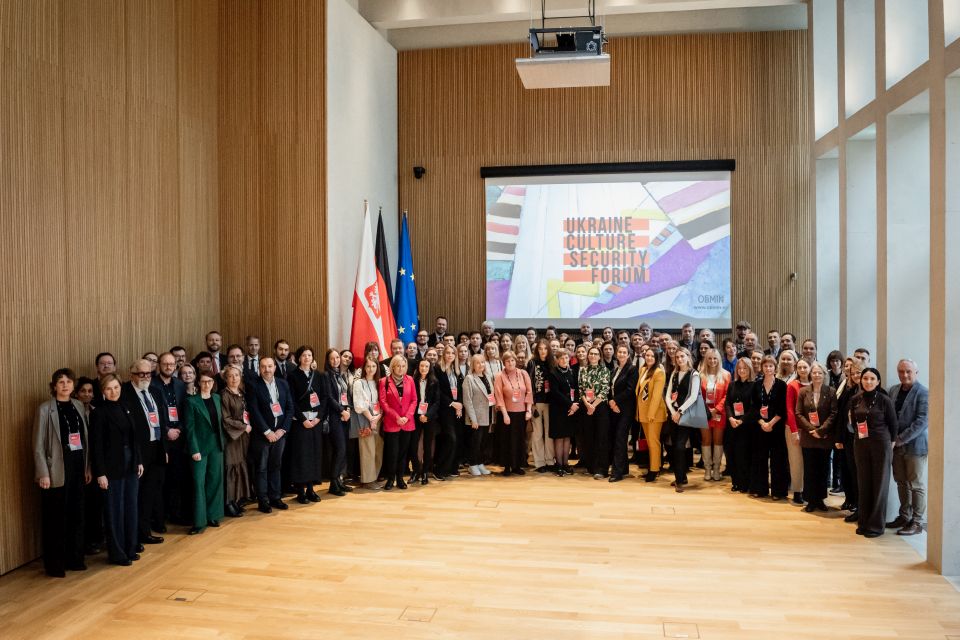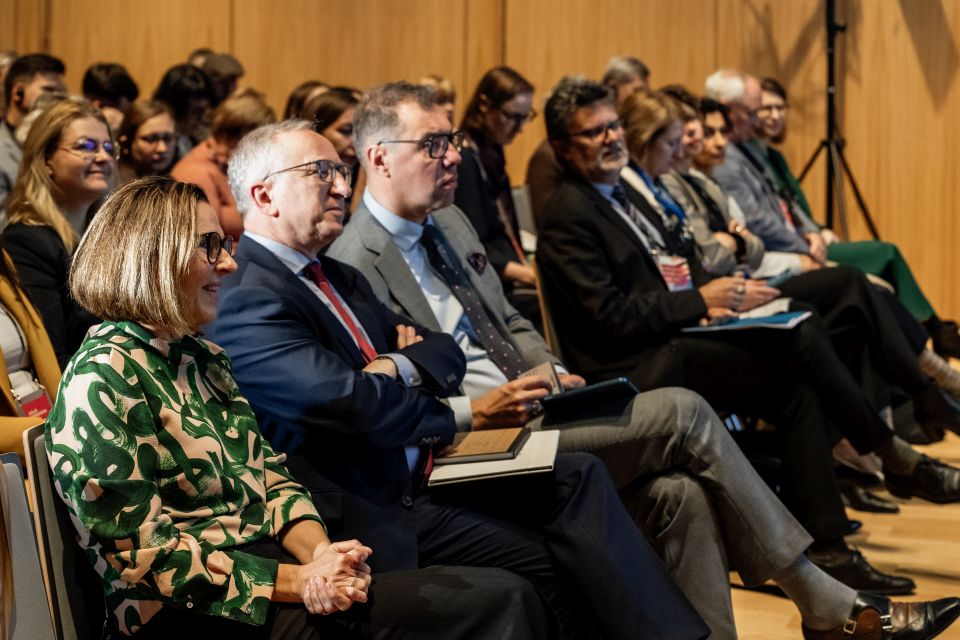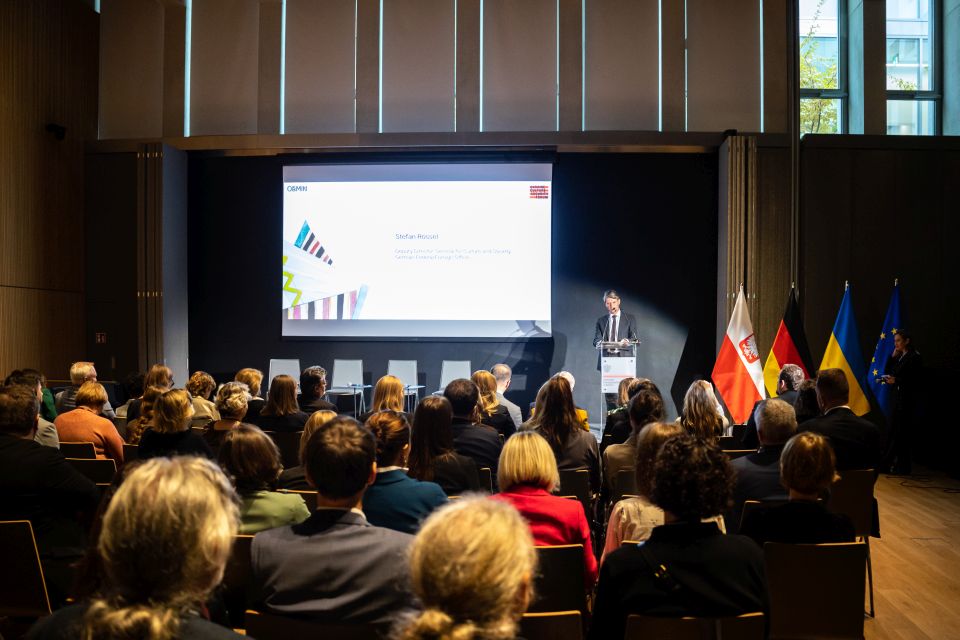UKRAINIAN CULTURE SECURITY FORUM - SUMMARY
October, 2025
Ukraine Culture Security Forum in Berlin: Culture as a Foundation of Security and Democracy
On October 22–23, 2025, the Ukraine Culture Security Forum took place in Berlin, hosted by the German Federal Foreign Office and the Embassy of the Republic of Poland in Germany. The event was organized by the OBMIN Foundation and numerous partners from Ukraine, Poland, Germany, and France. The event gathered representatives of ministries, museums, cultural institutions, NGOs, and international organizations to discuss how culture can contribute to national security, resilience, and democratic values in times of war and reconstruction.
Opening and Welcome
The Forum opened with a roundtable discussion at the German Federal Foreign Office. The second day of the Forum took place in the Embassy of the Republic of Poland in Berlin with welcoming remarks from Małgorzata Ławrowska–von Thadden (OBMIN Foundation) and Dr. Kateryna Rietz–Rakul (Ukrainian Institute in Germany). Official greetings were delivered by Jan Tombiński, Chargé d’affaires ad interim of the Republic of Poland in Germany; Oleksii Makeiev, Ambassador of Ukraine in Germany; Eric Chevreul, Counsellor for Cooperation and Cultural Affairs at the Embassy of France; and Stefan Rössel, Deputy Director-General for Culture and Society at the German Federal Foreign Office.
“Culture preservation is our shared responsibility,” said Eric Chevreul, underlining that upholding cultural principles means upholding democracy itself. Stefan Rössel added that
“Ukrainian cultural heritage is also our heritage,” reminding that defending culture is part of Europe’s collective security.
Ambassador Oleksii Makeiev emphasized that culture is an essential pillar of national security. “Cultural properties have been destroyed, but our work is not finished. We protect not only material things, but also knowledge and memory,” he noted, stressing ongoing international cooperation in protecting Ukraine’s cultural assets.
The Importance of Culture for Security
The first panel explored how culture contributes to national security frameworks. Gitte Zschoch (Ifa, Germany) highlighted the need for mutual learning and solidarity, acknowledging that European institutions are still learning how culture functions and survives during war. Silke Krummel (Agency for International Museum Cooperation) added that museums and cultural institutions “tell the story of who we are, which is why they must remain spaces of trust, education, and public dialogue.” Speakers agreed that culture not only documents identity but also strengthens democratic resilience and social cohesion — key components of national and regional security.
Culture in Hybrid Warfare and the Role of Institutions
The second panel focused on culture as a tool in hybrid warfare and the manipulation of narratives. Moderated by Myroslava Gongadze (Ukrainian Institute), the discussion explored propaganda, disinformation, and the responsibility of intellectuals in shaping truthful cultural memory. Participants highlighted how Ukrainian scholars and cultural professionals are facing targeted disinformation campaigns and direct threats. “We need to be aware of the targets being triggered by Russia,” one speaker noted, emphasizing the critical role of intellectuals in safeguarding the integrity of cultural discourse during wartime.
Many Ukrainian artists and academics have chosen to serve in the army, fully aware of the weight of that decision. Others continue to contribute through education, documentation, or preserving memory. As participants underlined, this ongoing debate within Ukrainian society—about how best to serve one’s country in times of war—reflects the deep interconnection between culture, responsibility, and resilience.
Countering Illicit Trafficking and Displacement of Cultural Property
In the third panel, experts addressed illegal excavations and cultural trafficking in occupied territories. Dr. Oksana Lifantii (National Museum of the History of Ukraine) called for recognizing such actions as cultural crimes on a national and international level. “We must protect not only heritage but also the cultural identity of Ukraine, which is being deliberately attacked,” she emphasized. Speakers also raised the issue of historical justice — asking how looted and displaced cultural property can be traced, reclaimed, and reintegrated into the shared European heritage.
Protection of Cultural Heritage in Wartime
The closing discussion centered on protection of cultural heritage during wartime
Prof. Susanne Keuchel reflected on how crises — whether war or the pandemic — have accelerated innovation in the cultural sector. “The tools we develop in times of crisis — digital platforms, education, and collaboration — can strengthen institutions far beyond the emergency,” she noted. She also emphasized the need to include education, civic participation, and community building in cultural protection, ensuring that museums remain accessible spaces where local communities feel represented and involved. Other speakers underscored that memory itself can become both a weapon and a path to justice, depending on how societies choose to use it.
Common Responsibility
The Ukraine Culture Security Forum once again underlined that protecting culture means protecting freedom, identity, and democratic order. The discussions emphasized that culture itself is a foundation of democracy — a shared European responsibility that connects societies beyond borders. The day was marked by vivid debate and many questions from the audience, reflecting how essential and timely such conversations are. The openness of the exchange showed a strong commitment to cooperation and understanding across countries and institutions. The ideas and partnerships formed in Berlin will continue to grow, strengthening international networks for cultural security and reaffirming that Ukraine’s culture is not only Ukraine’s concern, but a part of Europe’s common heritage and duty to protect.
Gallery of the Forum: https://obmin.eu/conferences.php?id=5&sub=gallery
We would like to thank our partners and all participants!
On October 22–23, 2025, the Ukraine Culture Security Forum took place in Berlin, hosted by the German Federal Foreign Office and the Embassy of the Republic of Poland in Germany. The event was organized by the OBMIN Foundation and numerous partners from Ukraine, Poland, Germany, and France. The event gathered representatives of ministries, museums, cultural institutions, NGOs, and international organizations to discuss how culture can contribute to national security, resilience, and democratic values in times of war and reconstruction.
Opening and Welcome
The Forum opened with a roundtable discussion at the German Federal Foreign Office. The second day of the Forum took place in the Embassy of the Republic of Poland in Berlin with welcoming remarks from Małgorzata Ławrowska–von Thadden (OBMIN Foundation) and Dr. Kateryna Rietz–Rakul (Ukrainian Institute in Germany). Official greetings were delivered by Jan Tombiński, Chargé d’affaires ad interim of the Republic of Poland in Germany; Oleksii Makeiev, Ambassador of Ukraine in Germany; Eric Chevreul, Counsellor for Cooperation and Cultural Affairs at the Embassy of France; and Stefan Rössel, Deputy Director-General for Culture and Society at the German Federal Foreign Office.
“Culture preservation is our shared responsibility,” said Eric Chevreul, underlining that upholding cultural principles means upholding democracy itself. Stefan Rössel added that
“Ukrainian cultural heritage is also our heritage,” reminding that defending culture is part of Europe’s collective security.
Ambassador Oleksii Makeiev emphasized that culture is an essential pillar of national security. “Cultural properties have been destroyed, but our work is not finished. We protect not only material things, but also knowledge and memory,” he noted, stressing ongoing international cooperation in protecting Ukraine’s cultural assets.
The Importance of Culture for Security
The first panel explored how culture contributes to national security frameworks. Gitte Zschoch (Ifa, Germany) highlighted the need for mutual learning and solidarity, acknowledging that European institutions are still learning how culture functions and survives during war. Silke Krummel (Agency for International Museum Cooperation) added that museums and cultural institutions “tell the story of who we are, which is why they must remain spaces of trust, education, and public dialogue.” Speakers agreed that culture not only documents identity but also strengthens democratic resilience and social cohesion — key components of national and regional security.
Culture in Hybrid Warfare and the Role of Institutions
The second panel focused on culture as a tool in hybrid warfare and the manipulation of narratives. Moderated by Myroslava Gongadze (Ukrainian Institute), the discussion explored propaganda, disinformation, and the responsibility of intellectuals in shaping truthful cultural memory. Participants highlighted how Ukrainian scholars and cultural professionals are facing targeted disinformation campaigns and direct threats. “We need to be aware of the targets being triggered by Russia,” one speaker noted, emphasizing the critical role of intellectuals in safeguarding the integrity of cultural discourse during wartime.
Many Ukrainian artists and academics have chosen to serve in the army, fully aware of the weight of that decision. Others continue to contribute through education, documentation, or preserving memory. As participants underlined, this ongoing debate within Ukrainian society—about how best to serve one’s country in times of war—reflects the deep interconnection between culture, responsibility, and resilience.
Countering Illicit Trafficking and Displacement of Cultural Property
In the third panel, experts addressed illegal excavations and cultural trafficking in occupied territories. Dr. Oksana Lifantii (National Museum of the History of Ukraine) called for recognizing such actions as cultural crimes on a national and international level. “We must protect not only heritage but also the cultural identity of Ukraine, which is being deliberately attacked,” she emphasized. Speakers also raised the issue of historical justice — asking how looted and displaced cultural property can be traced, reclaimed, and reintegrated into the shared European heritage.
Protection of Cultural Heritage in Wartime
The closing discussion centered on protection of cultural heritage during wartime
Prof. Susanne Keuchel reflected on how crises — whether war or the pandemic — have accelerated innovation in the cultural sector. “The tools we develop in times of crisis — digital platforms, education, and collaboration — can strengthen institutions far beyond the emergency,” she noted. She also emphasized the need to include education, civic participation, and community building in cultural protection, ensuring that museums remain accessible spaces where local communities feel represented and involved. Other speakers underscored that memory itself can become both a weapon and a path to justice, depending on how societies choose to use it.
Common Responsibility
The Ukraine Culture Security Forum once again underlined that protecting culture means protecting freedom, identity, and democratic order. The discussions emphasized that culture itself is a foundation of democracy — a shared European responsibility that connects societies beyond borders. The day was marked by vivid debate and many questions from the audience, reflecting how essential and timely such conversations are. The openness of the exchange showed a strong commitment to cooperation and understanding across countries and institutions. The ideas and partnerships formed in Berlin will continue to grow, strengthening international networks for cultural security and reaffirming that Ukraine’s culture is not only Ukraine’s concern, but a part of Europe’s common heritage and duty to protect.
Gallery of the Forum: https://obmin.eu/conferences.php?id=5&sub=gallery
We would like to thank our partners and all participants!
- German Federal Foreign Office
- Embassy of the Republic of Poland in Berlin
- Embassy of Ukraine in the Federal Republic of Germany
- Embassy of France in Germany
- Ministry of Culture and Strategic Communication of Ukraine
- Ukrainian Institute in Germany
- Ukrainian Red Cross Society (URCS)
- POLONIKA
- Polish Institute in Berlin
- Foundation for Polish - German Cooperation
- Platform Wiederaufbau Ukraine
- Stiftung Preußischer Kulturbesitz
- ORLEN
- Imre Kertész Kolleg Jena
- Robert Bosch Foundation
- Alla Horska and Victor Zaretsky Foundation
- Allianz Ukrainischer Organisationen in Deutschland
- Agency for International Museum Cooperation
- Pilecki Institute
- ifa - Institute for International Relations
- Stiftung Erinnerung, Verantwortung und Zukunft







